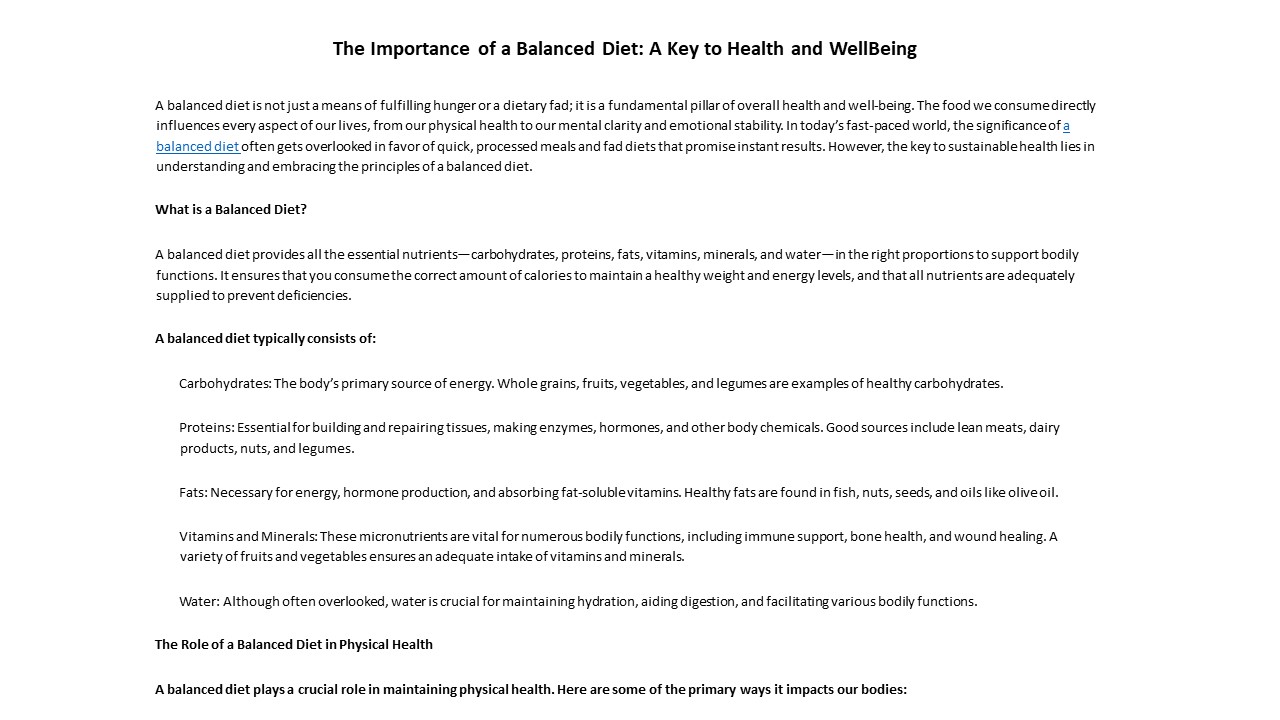The Importance of a Balanced Diet: A Key to Health and WellBeing (1) PowerPoint PPT Presentation
Title: The Importance of a Balanced Diet: A Key to Health and WellBeing (1)
1
The Importance of a Balanced Diet A Key to
Health and WellBeing
- A balanced diet is not just a means of fulfilling
hunger or a dietary fad it is a fundamental
pillar of overall health and well-being. The food
we consume directly influences every aspect of
our lives, from our physical health to our mental
clarity and emotional stability. In todays
fast-paced world, the significance of a balanced
diet often gets overlooked in favor of quick,
processed meals and fad diets that promise
instant results. However, the key to sustainable
health lies in understanding and embracing the
principles of a balanced diet. - What is a Balanced Diet?
- A balanced diet provides all the essential
nutrientscarbohydrates, proteins, fats,
vitamins, minerals, and waterin the right
proportions to support bodily functions. It
ensures that you consume the correct amount of
calories to maintain a healthy weight and energy
levels, and that all nutrients are adequately
supplied to prevent deficiencies. - A balanced diet typically consists of
- Carbohydrates The bodys primary source of
energy. Whole grains, fruits, vegetables, and
legumes are examples of healthy carbohydrates. - Proteins Essential for building and repairing
tissues, making enzymes, hormones, and other body
chemicals. Good sources include lean meats, dairy
products, nuts, and legumes. - Fats Necessary for energy, hormone production,
and absorbing fat-soluble vitamins. Healthy fats
are found in fish, nuts, seeds, and oils like
olive oil. - Vitamins and Minerals These micronutrients are
vital for numerous bodily functions, including
immune support, bone health, and wound healing. A
variety of fruits and vegetables ensures an
adequate intake of vitamins and minerals. - Water Although often overlooked, water is
crucial for maintaining hydration, aiding
digestion, and facilitating various bodily
functions. - The Role of a Balanced Diet in Physical Health
- A balanced diet plays a crucial role in
maintaining physical health. Here are some of the
primary ways it impacts our bodies - Weight Management Consuming a balanced diet
helps in maintaining a healthy weight. Overeating
or consuming nutrient-poor foods can lead to
weight gain and obesity, which are risk factors
for numerous health conditions such as diabetes,
heart disease, and stroke. Conversely,
undernutrition can lead to a lack of energy and
nutrient deficiencies, affecting overall health. - Disease Prevention A balanced diet is essential
in preventing chronic diseases. Diets high in
fruits, vegetables, whole grains, and healthy
fats have been linked to a lower risk of heart
disease, cancer, and other chronic conditions.
For example, diets rich in omega-3 fatty acids
(found in fish) have been shown to reduce
inflammation and lower the risk of heart disease.
- Improved Digestion A diet high in fiber from
whole grains, fruits, and vegetables promotes
good digestion and prevents constipation. A
healthy digestive system is crucial for the
absorption of nutrients and the elimination of
waste, which are essential for overall health. - Bone Health Calcium and vitamin D are critical
for maintaining strong bones. A balanced diet
that includes dairy products, leafy greens, and
fortified foods ensures adequate calcium intake,
while sunlight exposure and foods like fatty fish
provide vitamin D. - Boosted Immunity The immune system relies on
various nutrients, including vitamins A, C, E,
and zinc, to function effectively. A diet rich in
fruits, vegetables, nuts, and seeds provides
these essential nutrients, helping to protect
against infections and illnesses. - Longevity Research has shown that people who
consume a balanced diet tend to live longer,
healthier lives. A diet rich in antioxidants,
healthy fats, and fiber can reduce the risk of
age-related diseases and promote longevity. - The Impact of a Balanced Diet on Mental Health
- The relationship between diet and mental health
is profound. What we eat can affect our mood,
energy levels, and even cognitive function.

